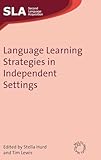Language Learning Strategies in Independent Settings / ed. by Stella Hurd, Tim Lewis.
Material type: TextSeries: Second Language AcquisitionPublisher: Bristol ; Blue Ridge Summit : Multilingual Matters, [2008]Copyright date: ©2008Description: 1 online resource (304 p.)Content type:
TextSeries: Second Language AcquisitionPublisher: Bristol ; Blue Ridge Summit : Multilingual Matters, [2008]Copyright date: ©2008Description: 1 online resource (304 p.)Content type: - 9781847690982
- 9781847690999
- Independent study
- Language and languages -- Study and teaching
- Second language acquisition
- LANGUAGE ARTS & DISCIPLINES / Study & Teaching
- L2 learner
- SLA
- Second Language Acquisition
- foreign language learning
- independent language learning
- language learning strategies
- learner strategy
- second language learning
- strategy
- 418.0071
- P53.445 .L36 2008
- P53.445
- online - DeGruyter
| Item type | Current library | Call number | URL | Status | Notes | Barcode | |
|---|---|---|---|---|---|---|---|
 eBook
eBook
|
Biblioteca "Angelicum" Pont. Univ. S.Tommaso d'Aquino Nuvola online | online - DeGruyter (Browse shelf(Opens below)) | Online access | Not for loan (Accesso limitato) | Accesso per gli utenti autorizzati / Access for authorized users | (dgr)9781847690999 |
Frontmatter -- Contents -- The Contributors -- Introduction -- Part 1: Language Learning Strategies: Theory, Research and Practice -- Chapter 1: Language Learning Strategies in Independent Language Learning: An Overview -- Chapter 2: Individual Variation and Language Learning Strategies -- Chapter 3: Hero With a Thousand Faces: Learner Autonomy, Learning Strategies and Learning Tactics in Independent Language Learning -- Part 2: Strategies for Skills Development in Independent Language Learning -- Chapter 4: Independent Second Language Reading as an Interdependent Process -- Chapter 5: Learning Strategies for Listening Comprehension -- Chapter 6: Second Language Composition in Independent Settings: Supporting the Writing Process with Cognitive Strategies -- Chapter 7: Speaking Strategies for Independent Learning: A Focus on Pragmatic Performance -- Chapter 8: Bringing the Learner Back Into the Process: Identifying Learner Strategies for Grammatical Development in Independent Language Learning -- Chapter 9: Deliberate and Incidental: Vocabulary Learning Strategies in Independent Second Language Learning -- Chapter 10: Strategies for Acquiring Intercultural Competence -- Part 3: Strategies for Learner Self-Management -- Chapter 11: Learning Logs and Strategy Development for Distance and Other Independent Language Learners -- Chapter 12: Affect and Strategy Use in Independent Language Learning -- Chapter 13: Collaborative Language Learning Strategies in an Email Tandem Exchange -- Chapter 14: Self-correction Strategies in Distance Language Learning -- Chapter 15: Strategies for Online Learning Environments -- Chapter 16: Integrating Strategy Instruction into Learning Materials -- Index
restricted access online access with authorization star
http://purl.org/coar/access_right/c_16ec
Language learning strategies have been a topic of research for roughly three decades. Broadly speaking, that research has focused on classroom tuition, predominantly at secondary level. Increasingly, however, language learning occurs in independent settings, whether at distance, on Institution-Wide Language Programmes (IWLPs), or in virtual environments. Success in independent language learning is achieved by autonomous individuals with a capacity for self-regulation. Yet we still know relatively little about the specific means they use to learn effectively, whether in terms of the affective strategies they employ to sustain motivation, the metacognitive strategies required for planning, monitoring and evaluating their learning, or the specific cognitive strategies applied to difficult learning tasks. These are all discussed and evaluated in Language Learning Strategies in Independent Settings.
Mode of access: Internet via World Wide Web.
In English.
Description based on online resource; title from PDF title page (publisher's Web site, viewed 01. Dez 2022)


